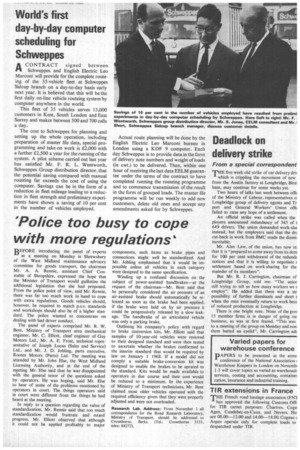'Police too busy to cope with more regulations'
Page 21

If you've noticed an error in this article please click here to report it so we can fix it.
EFORE introducing the panel of experts at a meeting on Monday in Shrewsbury of the West Midland maintenance advisory committee for goods transport, the chairman Mr. A. A. Rennie, assistant Chief Constable of Shropshire, expressed the hope that the Minister of Transport would guillotine the additional legislation that she had proposed. From the police point of view, said Mr. Rennie, there was far too much work in hand to cope with extra regulations. Goods vehicles should, however, be required to match p.s.v. standards and workshops should also be of a higher standard. The police wanted to concentrate on dealing with bad driver conduct.
The panel of experts comprised Mr. R. W. Bent, Ministry of Transport area mechanical engineer. Mr. C. Elliott, chief engineer of Guy Motors Ltd.,. Mr. A. E. Frost, technical representative of Joseph Lucas (Sales and Service) Ltd., and Mr. J. D. Jobling, parts executive, Rootes Motors (Parts) Ltd. The meeting was attended by Mr. John Else, the West Midland Licensing Authority, and at the end of the meeting Mr. Else said that he was disappointed with the general tenor of the questions asked by operators. He was hoping, said Mr. Else to hear of some of the problems mentioned by operators in court. The things operators said in court were different from the things he had heard at the meeting.
In reply to a question regarding the value of standardization, Mr. Rennie said that too much standardization would frustrate and retard progress. Mr. Elliott observed that although it could not be applied profitably to major components, such items as brake pipes and connections might well be standardized. And Mr. Jobling emphasised that it would be impossible unless all vehicles in each category were designed to the same specification.
Winding up a confused discussion on the subject of power-assisted handbrakes—at the request of the chairman—Mr. Bent said that he personally considered the air pressure of an air-assisted brake should automatically be released as soon as the brake had been applied; if the brake were held on by air pressure it could be progressively released by a slow leakage. The handbrake of an articulated vehicle was only a parking brake.
Outlining his company's policy with regard to brake conversion kits, Mr. Elliott said that samples of 10-year-old vehicles were restored to their designed standard and were then tested to ascertain whether the brakes conformed to the interim standard that would be required by law on January 1 1968. If a model did not comply a suitable brake-conversion kit was designed to enable the brakes to be uprated to the standard. Kits would be made available to operators in due course and their cost would be reduced to a minimum. In the experience of Ministry of Transport technicians, Mr. Bent claimed most older vehicles operated with the required efficiency given that they were properly adjusted and were not overloaded.
Research Lab. Address: From November 1 all correspondence for the Road Research Laboratory, Ministry of Transport, should be addressed to Crowthorne. Berks. (Tel.: Crowthorne 3131, telex; 84272).
























































































































